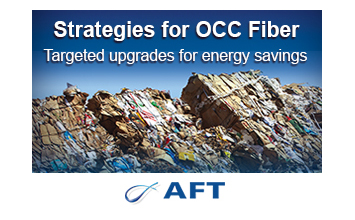Montreal, Québec – June 27, 2023 – FPInnovations, a non-profit specializing in creating solutions that support the global competitiveness of the Canadian forest sector, today acknowledges the contribution of the forest industry to the decarbonization strategy of lime kilns that aims to significantly reduce greenhouse gas (GHG) emissions produced by kraft pulp mills.
This strategy developed under Natural Resources Canada leadership and FPInnovations expertise will facilitate the use of local forest residues in replacement for the fossil fuels currently used to feed lime kilns, thus ensuring the maximization of forest supply.
Thorough process
Lime kilns are the largest emitters of non-biogenic GHG emissions in a pulp mill; therefore, they were identified as a well-defined and viable opportunity to target decarbonization. FPInnovations has surveyed technologies available to identify the most suitable pathways applicable to the Canadian industry context, including economics, design, and operational aspects as well as impact on the pulping process itself and its energy efficiency.
“A techno-economic comparison was completed across all identified pathways and FPInnovations compared the impact on GHG reduction for each pathway based on direct fossil fuel replacement potential. The analysis was completed with support of a steering committee consisting of various industry representatives across the country and closely observed by Natural Resources Canada”, explains Victor Padilla, Manager, Corrosion and Thermochemical Processes and leader of the project. “While the strategy has been completed for the overall Canadian environment, the implementation of fuel switching will need to be customized for each specific mill based on several factors including kiln design and its operational characteristics.”
Major environmental and economic benefits
It is estimated that a typically sized Canadian kraft mill could reduce emissions by 40 kt/y of CO2 eq; if half of the 28 kraft lime kilns in operation in Canada switched to biogenic fuel, it could reduce Canadian GHG emissions by over 500,000 t/y of CO2 eq, to significantly contribute to Canada’s net-zero targets while increasing the sector’s competitiveness and creating a huge opportunity for the Canadian forest sector. What’s more, investment into decarbonization of one lime kiln would result in a positive financial impact of about $6.8 M/y incentivized by a carbon tax of $170/tCO2 in 2030.
Quotes
“Decarbonizing our industry is a critical path moving forward. We continue to support the forest industry as a technology honest broker to identify the best solution with the least amount of risk to enable decarbonization of lime kilns in Canada.”
Stéphane Renou, President and CEO, FPInnovations
“We are excited to be a part of this collaborative effort lead by FPInnovations with the support of NRCan to identify pathways for the decarbonization of the Pulp and Paper Sector that support Canada’s net zero targets. Fuel switching our Lime Kilns represents a significant and economically viable opportunity for decarbonization. We are confident that, with the ongoing support of FPInnovations and NRCan, this can be implemented broadly across the industry.”
Members of the Lime Kiln Decarbonization steering committee
About FPInnovations
FPInnovations is a private not-for-profit organization that specializes in the creation of solutions that support the Canadian forest sector’s global competitiveness. It is ideally positioned to perform state-of-the-art research, develop advanced technologies, and deliver innovative solutions to complex problems for every area of the sector’s value chain, from forest operations to consumer and industrial products. Its R&D laboratories are located in Québec City, Montreal and Vancouver, and it has technology transfer offices across Canada.
Source: FPInnovations













